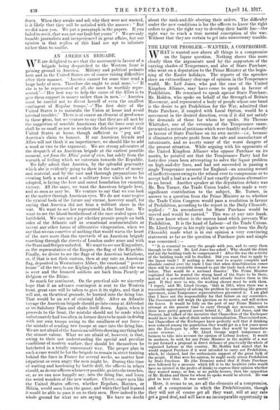AN AMERICAN BRIGADE.
WE are delighted to see that the movement in favour of a brigade being despatched to the Western front is gaining ground in America. Military and political pedants here and in the United States arc of course raising difficulties after their manlier. ' America cannot for some time send a large body of men. Therefore she ought to send none.'—` If she is to be represented at all, she must be worthily repre- sented.'—` Her best way to help the cause of the Allies is to give them support in money rather than in men.'—` America must be careful not to divest herself of even the smallest contingent of Regular. troops.'—' The first duty of the United States is to maintain the Union at. home and avoid internal troubles.' There is of course an element of good sense in these pleas, but we Venture to say that they arc all met by the suggestion of sensible Americans that the force sent over shall be so small as not to weaken the defensive power of the United States at home, though sufficient to peg out " America's claim to honour. If our American friends and Allies will not think it an impertinence, we should like to add a word or two to the argument. We are strong advocates of the despatch of an American brigade at the earliest possible moment, not from the Allies' point of view, but solely from the warmth of feeling which we entertain towards the .Republic.
We fully admit that America, by the splendid generosity which she is evidently going to show in the matter of money and material, and by the vast and thorough preparations for creating both a naval and a military force which arc to be adopted, is laying the best and surest foundation for ensuring victory. All the same, we want the American brigade here, and as soon as may be. We venture to say that we can look at the matter through American eyes. We do not want to give the cynical fools of the future any excuse, however small, for saying that America did not beat a militant share in the war. We want to see her represented in the front line. We Want to see the blood-brotherhood of the race sealed upon the battlefield. We care not a jot whether prosaic people on both sides of the Atlantic call us sensational sentimentalists or invent any other forms of alliterative vituperation, when we say that we can conceive of nothing that would warm the heart of the race more than the spectacle of an American brigade marching through the streets of London under arms and with the Stars and Stripes unfurled. We want to see our King salute, as the representative of the Empire, the flag of the Republic. Finally, we desire to see the flags of the American battalions, or, if that is not their custom, then at any rate an American flag, deposited in Westminster Abbey, the emotional " power- house" of the race, to use Kipling's noble phrase, until the war is over and the bronzed soldiers arc back from Picardy or Belgium or the Rhine.
So much for sentiment. On the practical side we sincerely hope that if an advance contingent is sent to the Western front, great care will be taken to give it its rights, and that it will not, on theatrical grounds, be hurried into the firing line. That would be an act of criminal folly. After an Atlantic voyage the American brigade should go into camp at Aldershot or on Salisbury Plain and shake itself down. Again, when it proceeds to the front, the mistake should not be made which unfortunately had too often in former days to be made in dealng with our own troops owing to the smallness of our force— the mistake of sending raw troops at once into the firing line. We are not afraid of the American soldiers showing anything but the utmost valour. What we are afraid of, however, is that, owing to their not understanding the special and peculiar conditions of modern warfare, they should let themselves be butchered in a totally unnecessary way. The proper plan in such a case would be for the brigade to remain in strict training behind the lines in France for several weeks, no matter how impatient or even angry the men might be. During this time of waiting and hardening by battle drill, the officers in relays should, as do our officers whenever possible, go into the trenches, or, as we can now happily say, into the firing line, and learn the weird wonders of the new warfare. Clever, eager men like the United States officers, whether Regulars, Marines, or Militia, would soon learn the game, and when they had learned it would be able to pass it on to their men. Here indeed is the whole ground for what we are saying. We have no doubt about the rank-and-file obeying their orders. The difficulty under the new conditions is for the officers to know the right orders to give, the right way to develop their battle line—the right way to reach a true mental conception of the war. Without that they are certain to get into unnecessary trouble.


























 Previous page
Previous page